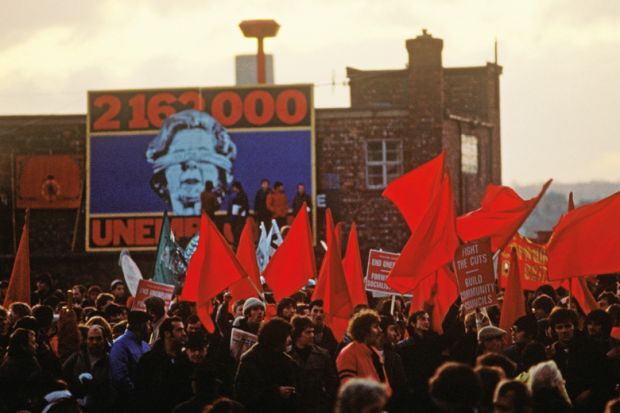My sister has a teddy bear called Joe. She got it for Christmas in 1984. Joe is still propped on my sister’s bed, where he’s been sitting since she was 10 years old. We never actually found out where Joe came from, other than what we knew from the label he had tied around his neck: “To a striking miner’s child. Merry Christmas. Love, Postman Joe (Liverpool branch)”.
During the 1984-85 miners’ strike, every Friday Liverpool postmen and women used to finish their early shift and drive down to Nottingham, bringing the food and money they’d collected from their trade union branches and from the wider community in Liverpool. These were dark times in the collective history of working-class life. Thatcherism as an ideology made no secret of its aim of smashing trade unions and putting an end to the collective class identity that had long been such a force in northern industrial towns and cities. But during those dark times there was also an incredible show of strength, humanity and love that my family – a striking family – was fortunate to experience first-hand.
Social historian Brian Marren’s rich and perceptive account of Liverpool during this period brought all this home to me. The love, the warmth and the experiences we shared are as remarkable as they are essential to remember in an age when working-class history is being rewritten by the victors. Marren brings the history of Liverpool to life in all its peculiarities and unique nature: a working-class city that has had many of its own dark times, but has always resisted and found humour in its struggle. Marren attributes this resistance to “Scouse scepticism”, and traces that identity back through a mash-up of its industrial workers, its connections to the sea, and the waves of people who came to the city on the Mersey from Ireland, the West Indies, Africa and southern Asia.
We Shall Not Be Moved takes us through the many struggles that Liverpool has been home to: mass unemployment in the 1940s, 1970s and 1980s; the struggles of the Irish migrant population who arrived as refugees from hunger and poverty; and then the so-called Toxteth riots, the 1981 uprising of unemployed young people on council estates. As Marren shows, Liverpool has been home to formidable organised working-class movements throughout its history, from the strength showed by the Transport and General Workers’ Union as British Leyland closed factories in the 1970s to the Militant tendency taking over Liverpool’s City Council and right up to the dock strikes in the 1990s.
However, what is particularly important about this book is its recognition of unorganised class struggles, particularly among Liverpool’s youth in the 1980s, and the imaginative ways that Scousers found strength and humour via those acts of resistance. The final chapter views this “fighting spirit” through the songs sung on the terraces at both Anfield and Goodison Park, when it seems the whole of Liverpool is singing, in unison, a tribute to sheer determination in the form of a traditional Labour protest song: “We shall not – we shall not be moved.”
Thirty-two years later, even my sister’s teddy bear Joe is still hanging on.
Lisa Mckenzie is research fellow in the department of sociology, London School of Economics, and author of Getting By: Estates, Class and Culture in Austerity Britain (2014).
We Shall Not Be Moved: How Liverpool’s Working Class Fought Redundancies, Closures and Cuts in the Age of Thatcher
By Brian Marren
Manchester University Press, 272pp, £75.00
ISBN 9780719095764
Published 1 January 2016
POSTSCRIPT:
Print headline: Laughing through the darkness
Register to continue
Why register?
- Registration is free and only takes a moment
- Once registered, you can read 3 articles a month
- Sign up for our newsletter
Subscribe
Or subscribe for unlimited access to:
- Unlimited access to news, views, insights & reviews
- Digital editions
- Digital access to THE’s university and college rankings analysis
Already registered or a current subscriber? Login




